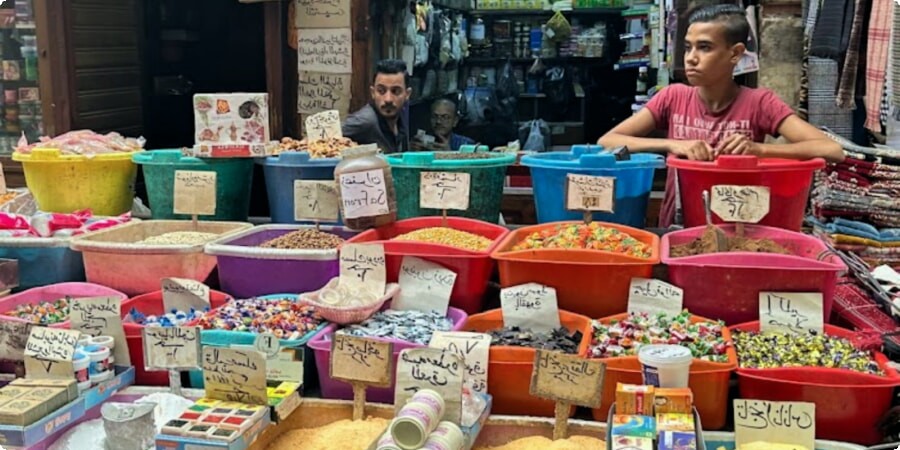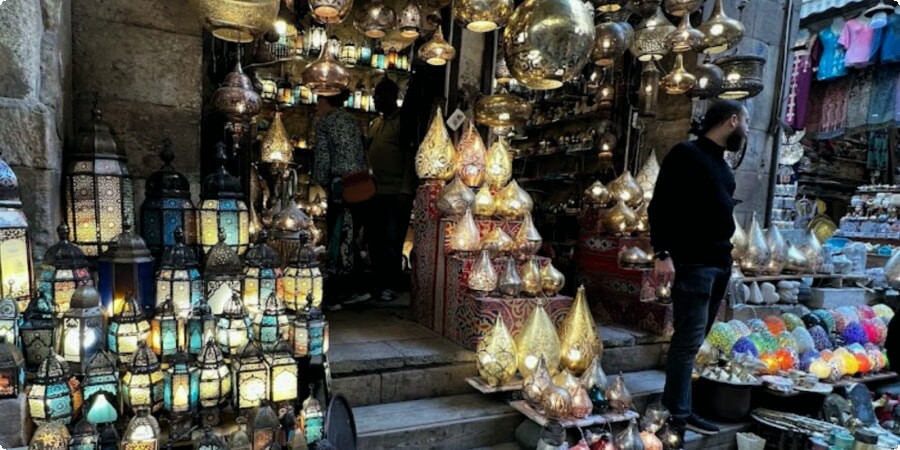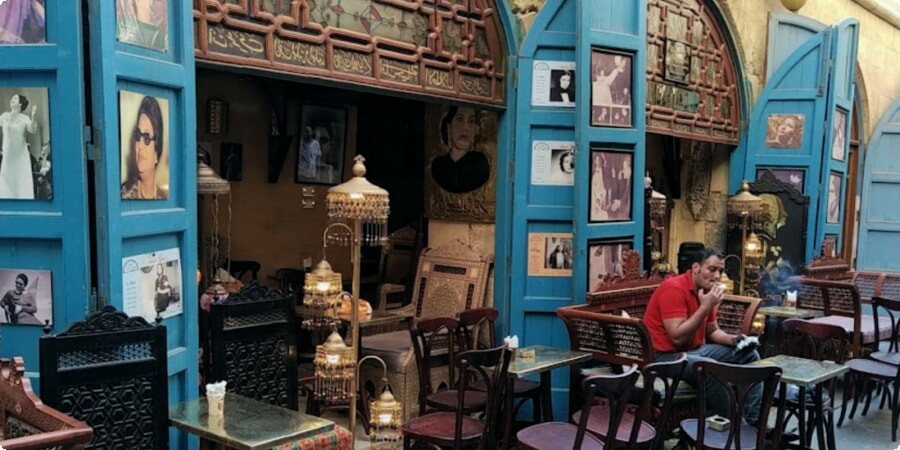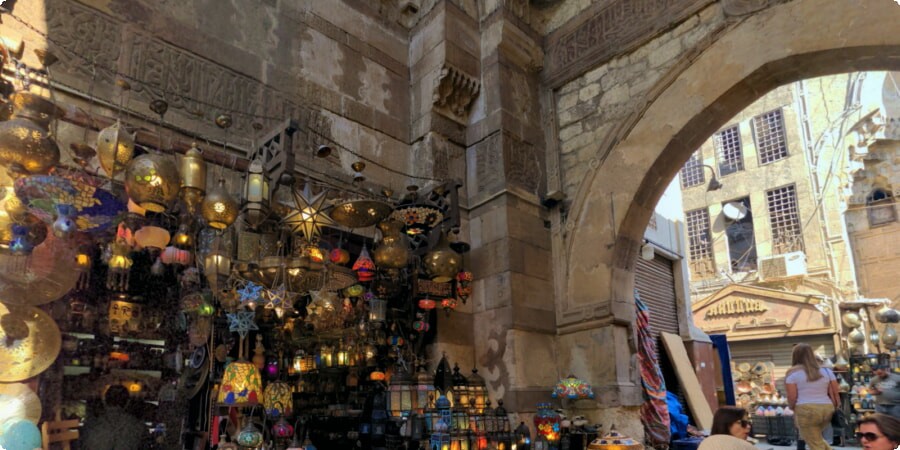A Journey Through Khan el-Khalili: Cairo's Historic Market
Khan el-Khalili, located in the heart of Cairo, is not just a market; it is a vibrant tapestry of history, culture, and commerce woven together over centuries. This bustling bazaar, with its labyrinthine alleys and centuries-old structures, offers a unique glimpse into the soul of Cairo. From the aroma of exotic spices to the glitter of handcrafted jewelry, every corner of Khan el-Khalili tells a story. This article aims to guide you through the rich history, architectural marvels, and cultural treasures of Cairo's most famous market.
A Glimpse into History
Khan el-Khalili has a rich and fascinating history that dates back to the 14th century. Founded in 1382 by Emir Djaharks el-Khalili, a powerful Mamluk ruler, the market was originally built as a caravanserai, a place where traders could rest and store their goods. Over the centuries, it evolved into a bustling hub of trade and commerce, attracting merchants from across the Middle East and beyond.
The market's historical significance is intertwined with Cairo's own development. During the Mamluk and Ottoman periods, Khan el-Khalili was the commercial heart of the city, with traders dealing in precious metals, spices, and textiles. It has witnessed the rise and fall of dynasties, survived political upheavals, and adapted to the changing tides of history, all while retaining its unique charm and character.
Walking through Khan el-Khalili today is like stepping back in time. The market's narrow streets and alleyways are lined with shops that have been handed down through generations, each one a living testament to the area's enduring legacy.
Architectural Marvels
One of the most striking features of Khan el-Khalili is its architecture. The market is a stunning blend of traditional Islamic design and modern influences, reflecting Cairo's diverse cultural heritage. As you wander through the market, you'll encounter a variety of architectural styles, from intricately carved wooden facades to grand stone arches.
The historic Al-Hussein Mosque, located at the southern end of the market, is one of the architectural highlights. Built in 1154, the mosque is considered one of the holiest Islamic sites in Cairo. Its elegant minarets and beautiful courtyard provide a serene contrast to the bustling market outside.

Another architectural gem is the Al-Fishawi Café, also known as the Mirror Café. Established in 1773, this café has been serving patrons for over two centuries and is adorned with ornate mirrors and traditional décor. It’s a perfect spot to take a break, enjoy a cup of mint tea, and soak in the market's timeless atmosphere.
As you explore, don't miss the various khanqahs (Sufi lodges) and madrasas (Islamic schools) scattered throughout the market. These structures, with their intricate tile work and elegant courtyards, offer a glimpse into the religious and educational life of historic Cairo.
To fully appreciate the beauty and complexity of Khan el-Khalili's architecture, it's recommended to spend a day or more wandering its alleys. For a convenient and comfortable journey to Khan el-Khalili, consider booking a car from Cairo Airport here. This will ensure you have ample time to explore every nook and cranny of this historic market.
Exploring the Market: What to See and Do
Khan el-Khalili is a sensory overload in the best possible way. The market is a maze of narrow streets and bustling alleyways, each packed with shops and stalls offering an array of goods. Whether you’re hunting for unique souvenirs or simply soaking up the atmosphere, there’s plenty to see and do.
Must-Visit Shops and Stalls:
- Souq Al-Ghouri: Located near the Al-Ghouri complex, this section of the market is famous for its traditional crafts. Here, you can find intricately designed lamps, brassware, and textiles.
- Perfume Shops: Perfume shops are a staple in Khan el-Khalili. You can find exotic oils and scents that have been a part of Egyptian culture for millennia.
- Jewelry Stalls: Gold and silver jewelry, often featuring traditional Egyptian designs, are abundant. Look out for handcrafted pieces that are unique to this market.
- Spice Market: The aroma of spices fills the air, and you can purchase everything from saffron to sumac. The spice market is a feast for the senses and a great place to pick up some culinary souvenirs.
Unique Products to Look Out For:
- Egyptian Papyrus: Many shops sell papyrus paintings, depicting scenes from ancient Egyptian mythology and history.
- Leather Goods: From bags to sandals, the leather goods here are often handmade and of high quality.
- Glassware: Beautifully crafted glassware, including perfume bottles and decorative items, are available in many stalls.
As you explore, take your time to talk with the shopkeepers. They often have fascinating stories about their goods and the history of the market.

The Art of Haggling
Haggling is an integral part of the shopping experience in Khan el-Khalili. While it might seem daunting at first, with a few tips and a bit of practice, you can master the art of negotiation and enjoy the process.
Tips and Tricks for Negotiating Prices:
- Start Low: Begin by offering a price lower than what you’re willing to pay. This gives you room to negotiate.
- Be Polite: Always haggle with a smile and a friendly attitude. It’s a cultural exchange, not a battle.
- Know When to Walk Away: If the price isn’t right, don’t be afraid to walk away. Often, this will prompt the vendor to offer you a better deal.
- Cash is King: Having cash on hand can sometimes get you a better price than using a credit card.
Cultural Etiquette:
- Respectful Interaction: Always be respectful and courteous. Remember, haggling is part of the culture and should be enjoyed.
- Understand the Value: It’s important to appreciate the craftsmanship and value of the items. Haggling doesn’t mean undervaluing the seller’s work.
Learning to haggle can enhance your shopping experience and help you connect with the local culture. Plus, it’s a great way to ensure you get the best deals on your purchases.
Culinary Delights
Khan el-Khalili isn’t just a shopper’s paradise; it’s also a haven for food lovers. The market is dotted with eateries and street food vendors offering a taste of authentic Egyptian cuisine. Here are some culinary highlights you shouldn’t miss.
Popular Street Food Stalls and Traditional Dishes:
- Koshari: A traditional Egyptian dish made with rice, lentils, pasta, and topped with a spicy tomato sauce and crispy fried onions. It’s a must-try and can be found at many street food stalls.
- Falafel (Ta’ameya): Egyptian falafel is made with fava beans and is typically served in a pita with tahini, salad, and pickles.
- Grilled Meats: Look out for vendors grilling kebabs and kofta. The aroma alone is enough to draw you in.

Cafes and Restaurants:
- El-Fishawi Café: One of the oldest cafés in Cairo, El-Fishawi is a legendary spot in Khan el-Khalili. Open 24 hours a day, it’s the perfect place to enjoy a cup of mint tea or a strong Turkish coffee while watching the world go by.
- Naguib Mahfouz Café: Named after the Nobel Prize-winning Egyptian author, this café offers a more upscale dining experience with a menu featuring traditional Egyptian dishes.
For a hassle-free culinary adventure and to explore more of Egypt’s gastronomic delights, consider booking a car here. This will allow you to conveniently travel to and from Khan el-Khalili and other dining hotspots in Cairo.
Cultural Experiences and Souvenirs
Khan el-Khalili isn't just a place to shop; it's also a cultural hub where visitors can immerse themselves in Egypt's rich heritage. Beyond the hustle and bustle of the market stalls, there are plenty of cultural experiences to enjoy and unique souvenirs to take home.
Cultural Experiences:
- Sufi Music and Dance Performances: Many evenings, you can witness mesmerizing Sufi music and dance performances in the streets of Khan el-Khalili. These spiritual performances are a captivating display of devotion and artistry.
- Artisan Workshops: Throughout the market, you'll find artisans practicing traditional crafts such as calligraphy, pottery, and weaving. Some workshops even offer hands-on experiences where you can learn these ancient techniques yourself.
- Visits to Historic Sites: Khan el-Khalili is surrounded by historic sites, including the Al-Azhar Mosque and the Sultan Al-Ghuri Complex. Take some time to explore these architectural marvels and learn about their significance in Cairo's history.
Souvenirs:
- Traditional Clothing and Accessories: Khan el-Khalili is a great place to purchase traditional Egyptian clothing such as galabeyas (long robes) and shawls. You can also find beautiful accessories like scarves, belts, and jewelry adorned with traditional designs.
- Handmade Crafts: Support local artisans by purchasing handmade crafts such as ceramics, glassware, and wood carvings. These unique items make for memorable souvenirs and gifts.
- Spices and Herbs: Bring home the flavors of Egypt by purchasing spices and herbs from the market's spice stalls. Whether you're looking for saffron, cardamom, or hibiscus tea, you'll find a wide variety of aromatic treasures to choose from.
Exploring the cultural offerings and shopping for souvenirs in Khan el-Khalili is a journey of discovery and appreciation for Egypt's rich cultural heritage.

Practical Tips for Visiting
While Khan el-Khalili is a captivating destination, navigating its narrow streets and bustling crowds can be overwhelming for first-time visitors. Here are some practical tips to help you make the most of your visit:
Best Times to Visit:
- Early Mornings: Khan el-Khalili is less crowded in the early morning hours, making it an ideal time to explore the market at a leisurely pace.
- Late Afternoons: Late afternoons are another good time to visit, as the market starts to quiet down and the temperature becomes more comfortable.
Getting There:
- Public Transportation: The market is easily accessible by Cairo's public transportation system, including buses and the Cairo Metro. The nearest metro station is El-Ghuriya.
- Taxi or Ride-Hailing: Taxis and ride-hailing services like Uber and Careem are also convenient options for getting to Khan el-Khalili.
Safety Tips:
- Keep Valuables Secure: Pickpocketing can be a problem in crowded areas like Khan el-Khalili, so be sure to keep your belongings secure and be vigilant of your surroundings.
- Respect Local Customs: Khan el-Khalili is a conservative area, so it's important to dress modestly and respect local customs and traditions.
Accommodations:
- Stay Nearby: To fully immerse yourself in the Khan el-Khalili experience, consider staying at a hotel or guesthouse in the nearby area. Many accommodations offer views of the market and easy access to its attractions.
Exploring Khan el-Khalili is a journey into the heart and soul of Cairo. From its rich history and architectural marvels to its vibrant cultural experiences and unique souvenirs, the market offers a glimpse into Egypt's past and present. Whether you're haggling with vendors, sampling street food, or marveling at historic sites, Khan el-Khalili is sure to leave a lasting impression on every visitor. So, grab your map, put on your walking shoes, and get ready to embark on an unforgettable adventure through Cairo's historic market.